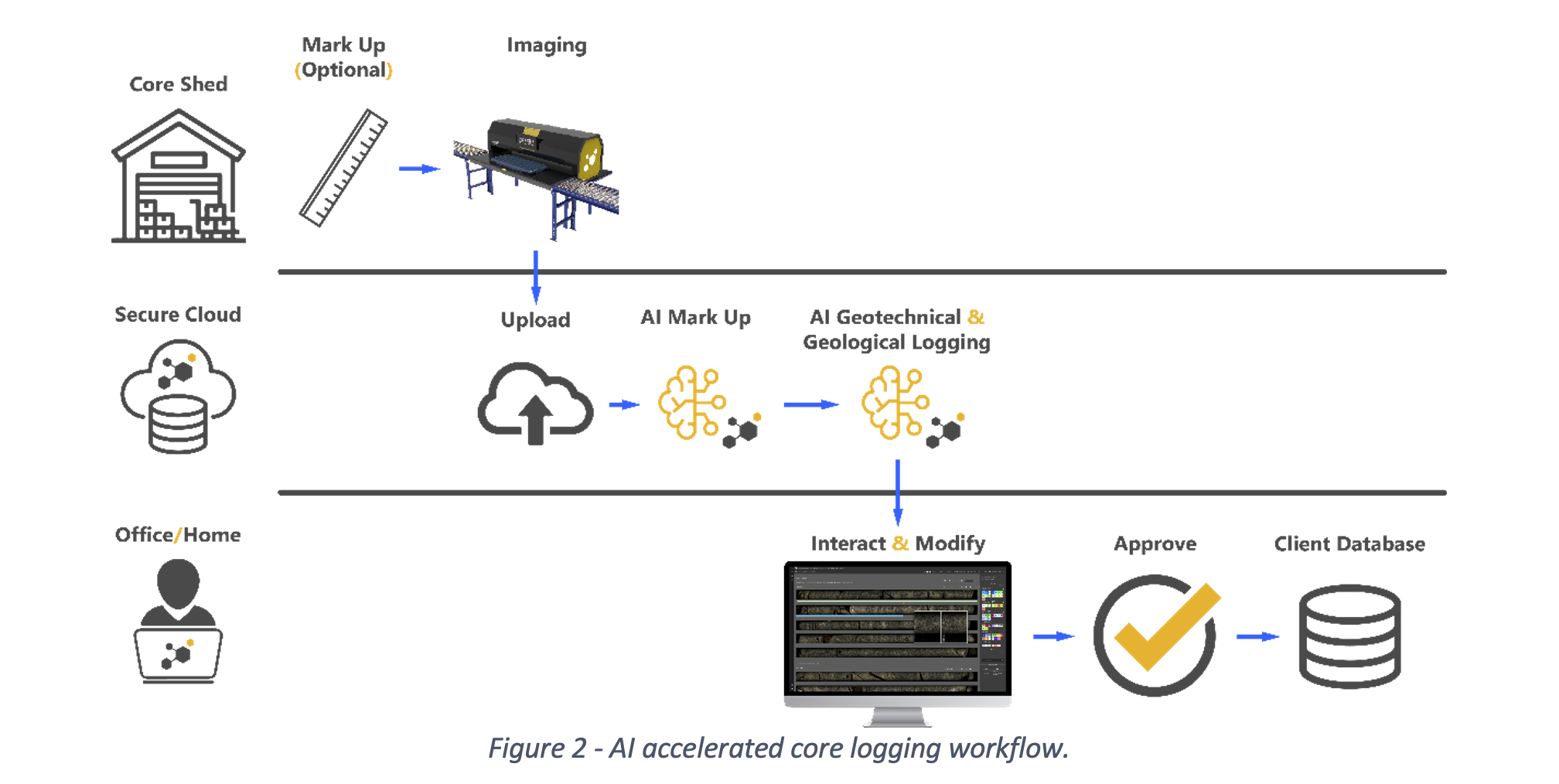
KORE Geosystems, one of whose founders is a CivMin professor and alumnus, has received federal funding of $1 million towards an innovative process in the mining sector. The proposed innovation involves artificial intelligence (AI) automation in the evaluation of examining and logging core samples from exploration operations, solving one of the largest bottlenecks in the industry.

At the recent Mining Innovation Commercialization Accelerator (MICA) Network conference, held in Toronto on Thursday, June 22, Professor Sebastian Goodfellow (MIE MASc 1T0, CivE PhD 1T5) presented for KORE. His proposal, titled “AI For Everyone: Accelerating core logging using a novel geologist-in-the-loop AI platform” requested $1 million towards the total project cost of $8 million. In all, the federal government presented 24 proposals with more than $15 million in funding, out of the more than 80 submissions.
Mining companies spend an exorbitant amount of money drilling, then cataloguing the details of the core samples. Some mine sites, known to drill 250,000 metres of samples each year, can spend hundreds of dollars per metre. “Drill core is an essential data source that informs critical processes throughout the mining lifecycle,” says Goodfellow. “A major industry challenge is that logging teams cannot accommodate the pace of drilling, resulting in massive backlogs representing unrealized investments and delayed decision-making.”
With this announcement positioning the funding as placing the environment and Canada in more competitive positioning, the release claims, “The Government of Canada is investing in innovative mining solutions that will better equip Canada’s mining sector to become a major industrial player in the new green economy.”
As nations look towards embracing a green economy, including the reduction of carbon emissions, large amounts of minerals such as graphite, copper, lithium and nickel will be needed to power the green and digital economy at home and around the world. The result is the need to drive and embrace efficiencies in the mining sector, both in labour, energy expenditure, timeliness and beyond.
Up for overcoming hurdles with this unique AI solution, Goodfellow explains, “It is challenging to grow logging teams because geologists are in short supply for reasons related to the great resignation, work-life balance, and an aging workforce.”
“If the team can scale, the increase in the team’s size results in a significant drop in consistency. The pace and consistency of logging represent one of the largest bottlenecks in the mining lifecycle. Our solution aims to improve productivity, eliminate backlogs, improve the consistency of logs, and enable remote work.”
Using an AI process to automate the examination, measuring and evaluation of specimens can easily replace the mundane, manual and traditional methods. First, a consistent method of imaging the samples in a tray is accomplished via standardized lighting and angle. Then the AI can scan the images and place holders to mark measurements on a screen – each catalog can be manually adjusted by an operator later if desired. All of the digitized images are accessible for reference and can be viewed remotely at any time.
Goodfellow notes the entire process is dependent upon human expertise, “Our AI models are built using a geologist-in-the-loop continuous learning approach, which allows the model to achieve greater accuracy in a drastically reduced amount of time by allowing the model to choose the data from which it learns. By incorporating geologists into the model training loop, the model is guided and corrected throughout its “life” building trust and drastically improving the scalability and impact of this technology. “

MICA’s call for proposals invited applicants to submit projects to position Canada as a global leader in mining innovation by accelerating the commercialization of made-in-Canada groundbreaking technologies.
Applications came from across Canada with projects spanning the four technical themes of MICA:
- Increase mine production capacity, at a lower cost.
- Reduce mining energy consumption and greenhouse gas emission
- Implement smart, autonomous mining systems.
- Reduce environmental risk and long-term liabilities.
According to a release by the federal government, MICA’s funding will allow the recipients to create new tools which will reduce carbon emissions, expand the use of autonomous driving for underground mining, and result in overall efficiencies enabling our domestic industry to become safer for personnel and the environment.
By Phill Snel
Professor Sebastian Goodfellow was recently featured in a U of T Magazine article, Tremors of the heart, about a collaborative project with clinicians using AI to detect heart rhythm abnormalities at Toronto’s Hospital for Sick Children (SickKids).